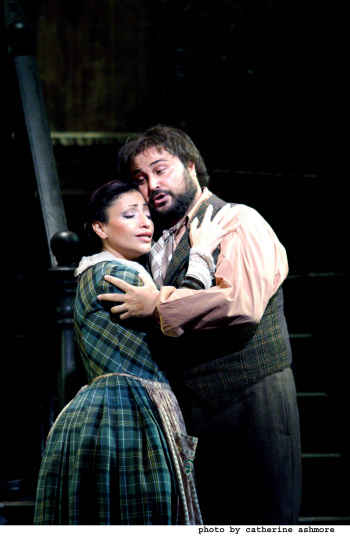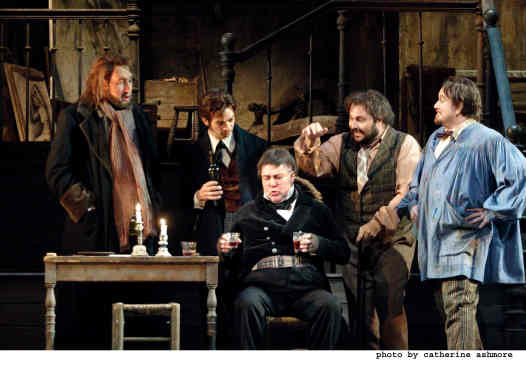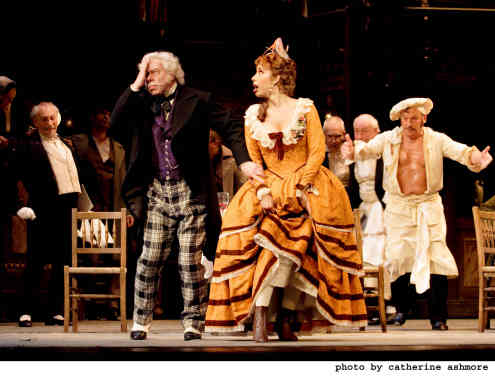Other Links
Editorial Board
- Editor - Bill Kenny
- London Editor-Melanie Eskenazi
- Founder - Len Mullenger
Google Site Search
SEEN
AND HEARD OPERA REVIEW
Puccini, La Bohème : Soloists,
chorus and orchestra of the Royal Opera House, Covent Garden.
Conductor: Christian Badea. Royal Opera House, Covent Garden,
13.7.2008. (JPr)
At the end of the matinee performance the ovations died away and
the house lights went up and a voice behind me said to her
companion ‘I finally get to La bohème at Covent
Garden and the tenor is on crutches!’ This wasn’t quite the story
but more of this later.
The success of John Copley’s staging, here in its twenty-first
revival, lies in a sense of cinematic-style realism involving
cast, chorus and extras (totalling 100 or so in Act II). There was
meticulous research behind the late Julia Trevelyan Oman’s
ultra-faithful designs and, as a eulogising programme note
declares, ‘The doors in La bohème work’! It is a ‘jolly
good show’, is a sell-out every time it is put on and is not ready
to be pensioned off yet, indeed it will return (with the same
conductor) this October to celebrate John Copley’s sixtieth
anniversary of working for The Royal Opera.
Clearly in these circumstances the dramatic heart of the work
shifted to the Marcello-Musetta relationship from Act II. Her
coquettishness and his jealousy gives way to their reconciliation
in Act IV. American soprano Nicole Cabell revealed great comic
timing and after an uncertain start with apparent intonation
problems, vocally went from strength to strength during and after
her ‘Quando m’en vo’.

Roberto Aronica as Rodolfo and Cristina
Gallardo-Domas as Mimì
This opera was Puccini’s fourth for the stage. It was produced at
Turin in 1896, and was not an instant hit with the critics. The
next year the Carl Rosa Company presented it in English at
Manchester, and a few months later at Covent Garden. On 30 June
1899 it was sung at Covent Garden in Italian and became a staple
of the repertory, surviving two World Wars until it was replaced
in 1974 by the current John Copley production.
The librettists’ source material was Murger’s novel Scènes de
la vie de Bohème and they selected four of the characteristic
episodes and imbued them with the spirit of the original. Although
set in Paris about 1820, the story is a timeless one with
considerable contemporary resonances. Far too many people believe
that a composer’s output evolves in isolation from their personal
life and the world in which he or she lives, but this certainly
was not the case for Puccini as recent research continues to
confirm. He is yet another composer whose masterpieces are often
biographical in nature and here in La bohème there is the
reminiscence of Puccini’s own student days, sharing a room in
Milan with Mascagni, and probably recalling something about lost
love too. Indeed his graduation exercise from the Milan
Conservatoire, Capriccio sinfonico, is the first
music we hear as the curtain rises for La bohème.
Certain elements of Puccini’s musical style help to confirm La
bohème as the ‘masterpiece’ it genuinely is. Puccini appears
more open to the concept of symphonic development of the German
masters than other Italian opera composers (Verdi especially).
Based on this idea, Act II has been considered the ‘scherzo’ and
Act III the ‘slow movement’. There is a greater sense of La
bohème and his other operas being ‘through-composed’ just as
one might hear in a movement from a symphony. We know only too
well that certain Puccini arias and ensembles can be taken out of
their original context and performed on their own, yet the opera's
in full contain very little sense of having ‘numbers’,
as are found in Verdi’s operas up to Otello and Falstaff.
Perhaps more importantly, Puccini used something called
'thematic reminiscence' that is not far removed from Wagner’s
leitmotifs. Here in La bohème, there are themes associated
with the Bohemians and with Mimì, among others.

Matthew Rose as Colline, Roderick Williams as
Schaunard, Jeremy White as Benoit,
Roberto Aronica as Rodolfo and Franco Vassallo as Marcello
This has been a difficult season for the Royal Opera with many
cancellations and much illness disrupting plans of many years
standing and even now, with so few performances remaining, they
were not to get off Scot-free. It was announced that the Italian
tenor Roberto Aronica had badly injured a knee, was in
‘considerable pain’ and would use a stick. This had meant extra
rehearsals with the principal cast to adjust the staging
accordingly. The tenor could not manage the stairs so Mimì entered
at the front of stage-left in Act I and there was quite a lot of
fussing with chairs so that he could sit down as often as
possible. This meant that the ‘horse-play’ amongst the Bohemians
did not seem quite as interminable as it can, particularly in Act
IV, and overall there was a spontaneity to events that you do not
expect for a twenty-first revival. I have seen this production a
dozen or more times over the years and this was the freshest it
has been for a long time, due to a combination of the
presence of the original director and the tenor’s adversity.
Roberto Aronica has a full-throated tenor voice with an
effortlessly secure high C. His acting skills were a little
difficult to assess in the circumstances but he seems one of the
more relaxed and natural actors of this generation of tenors. He
has a broad smile, bushy black beard and full head of hair (a
wig?) that along with his infirmity was all too reminiscent of
both the sadly missed Luciano Pavarotti. The sound
is similar to his, too, in the upper echelons of the voice, but
there was also a noticeable gear change at times and his voice was
sometimes reminiscent of his mentor Carlo Bergonzi. His Mimì was
the Chilean, Cristina Gallardo-Domas, and she gave us a sense of
the character’s great anxiety as to what life has in store for
her, while the delicacy and insecurity of her voice matched her
characterisation, although it might seem more suited for
Cio-Cio-San.
Both Aronica and Gallardo-Domas could sound somewhat stentorian at
times, but they brought great tenderness to their ‘Addio, dolce
svegliare’ in Act III. This was especially luminous because of the
revised production.

Donald Maxwell as Alcindoro and Nicole Cabell as
Musetta
Making his debut with the Royal Opera, the Italian baritone Franco
Vassallo is an interesting discovery, his voice full of
insouciance and charm that reminded me of the young Thomas Allen
whom I saw in this role during the 1980s.
For once, home-grown talent was on stage in strength. Roderick
Williams was a supremely confident Schaunard with an elegant
baritonal voice, and in the imposing physique and bass voice of
former Young Artist Matthew Rose as Colline, ‘Vecchia
zimarra, senti’ that strange farewell to his coat in Act IV has
rarely before had so much heartfelt resonance. Surely he will
eventually sing Marke in Tristan und Isolde as his voice is
ideal for it. Last but not least in this wonderful ensemble were
the masterly vignettes from stalwarts Jeremy White as the
lascivious Benoit and Donald Maxwell as the cuckolded Alcindoro.
There was some elegant playing, as is to be expected, from the
Royal Opera House orchestra under Christian Badea, who was
returning to a production he conducted in 1996. There was suitable
attack from the strings, bright brass and sweet-toned woodwind.
That there was some indulgence in the tempi when it came to his
Rodolfo particularly - and occasionally for Mimì - is
understandable in the circumstances, as was his inability always
to balance the sound from stage and pit sufficiently.
There were nevertheless so many wonderful moments, particularly
from the moment Rodolfo and Mimì are alone at last in Act IV
through to the very sad end, that any other doubts could be
forgiven and forgotten. The audience, pace the one lone
voice bemoaning her lot, seemed satisfied as always, and so was I.
Jim Pritchard
Pictures © Catherine Ashmore
Back to Top Cumulative Index Page
